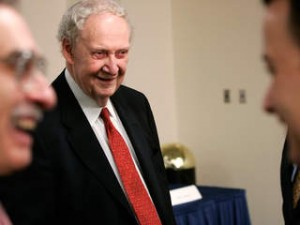Goodbye, Judge Bork—Goodbye, My Friend
/As it happened, I was able to spend a couple of hours between flights with Bob Bork just ten days before he died, and I got to tell him of my gratitude for so much friendship and laughter over the past quarter-century, of my admiration for his depth, and—embarrassing him, as I knew this would—of my love for him. Bob was of the strong stock that keeps emotions such as love to himself. That’s one reason I loved him.
 On such occasions—his many friends loved him mightily and showed it in many angular ways—one could see him squirm with conflicting emotions. He certainly must not accept that, and yet a smile at the corner of his lips and a rising blush up his very white cheeks betrayed his pleasure. His method of fleeing from admiration and (God forbid) love was normally a scoffing rebuke, behind which came a wee smile.
On such occasions—his many friends loved him mightily and showed it in many angular ways—one could see him squirm with conflicting emotions. He certainly must not accept that, and yet a smile at the corner of his lips and a rising blush up his very white cheeks betrayed his pleasure. His method of fleeing from admiration and (God forbid) love was normally a scoffing rebuke, behind which came a wee smile.
His friends loved him because he was brilliant, always ready with witticisms and lightning insights, and altogether warm of heart himself. It was a joy to watch him with his children and Mary Ellen. Several of those around him thought his was the most radiant intellect they knew: The most famously bright people in Washington always deferred to him. His mind was radiant on things vast—and also domestic. We smiled at the way he and Mary Ellen joshed each other constantly, in the glow of unmistakable union.
Bob was a serious man about his deepest convictions, uncommonly self-aware down to a very great depth. For years there was no sign that he was even thinking of becoming a Catholic, as Mary Ellen was; he sometimes pretended to be an unshakably severe and reserved Pittsburgh Presbyterian—almost never explicitly religious at all. Of course, when he did seek instruction in the Catholic faith, he did so publicly during one of the worst possible and most humiliating years in the history of the American Church, 2003, just as the painful clergy sexual abuse scandal was at the height of exposure in the media. It was just like Bob’s courage (in his great intellectual courage) to go ahead in that unpropitious period.
It was just like his unfailing wit that it had not escaped his notice that baptism in that advanced year of his life carried a double blessing: It washed away all his prior sins, and arrived just when his seniority rendered unlikely all those that had brought the most pleasure.
Bob and Mary Ellen first met at a party of mine and Karen’s—a book party—and shortly afterwards Karen and Mary Ellen drove many hours together out to Notre Dame. Bob had lost his first and deeply loved wife to cancer some years before, and it had seemed to some unlikely he would remarry. On that car trip, Karen picked up signs that, given some time, it just might happen. We were glad.
We also had the immense privilege of taking Bob and Mary Ellen to dinner on the eve of his much-embattled confirmation vote in the Senate. (I always thought that Senator Ted Kennedy’s demagogic, malicious, and falsehood-ridden assault on Judge Bork, at the very beginning of the confirmation process, was the foulest deed of Kennedy’s leadership in the Senate—it properly won its own disgraceful public epithet.) After this dinner, Karen mentioned to me Bob’s astonishing equanimity.
Late in the dinner, he said something like: “At one time, I would have given my right arm to become a justice of the Supreme Court. But now, if I don’t, I will write more freely—not just in legalese—of ideas necessary to the republic in these years.”
At another point, he said something like: “I know some wanted me to kiss babies, and cut off my beard, and appeal more to public sentiment. But that’s not me. That’s how politicians behave. It is not how justices behave. I couldn’t possibly do that. It would have betrayed everything I believe about the law.”
Concentrating on friendship, we laughed a lot at that dinner. In the car, Karen admitted that she admired the inner spirit of Robert Bork more than ever. She herself was well experienced to the steel of spirit (and humor) needed in dark times.
Others may write better on Judge Bork’s pre-eminence among jurists of his generation, and the capaciousness of his mind in the history of law. Today I mourn, and want to honor a man great of spirit.
Michael Novak, one of the founders of First Things, was for more than two decades a colleague of Judge Bork at the American Enterprise Institute.
Published at First Things on December 21, 2012
